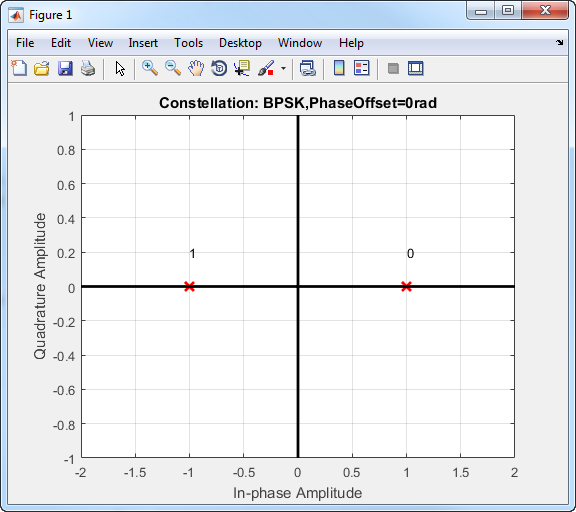comm.BPSKModulator
(To be removed) Modulate using BPSK method
comm.BPSKModulator will be removed in a future release. Use pskmod instead. For information on updating your code, see Version History.
Description
The comm.BPSKModulator object modulates using the binary
phase shift keying method. The output is a baseband representation of the modulated signal.
The input signal must be a discrete-time binary-valued signal. If the input bit is 0 or 1,
then the modulated symbol is exp(jθ) or -exp(jθ), respectively. The PhaseOffset property specifies the value of θ in radians.
To modulate a signal using BPSK method:
Create the
comm.BPSKModulatorobject and set its properties.Call the object with arguments, as if it were a function.
To learn more about how System objects work, see What Are System Objects?
Creation
Syntax
Description
bpskmodulator = comm.BPSKModulator
bpskmodulator = comm.BPSKModulator(Name,Value)Name1,Value1,...,NameN,ValueN).
bpskmodulator = comm.BPSKModulator(phase,Name,Value)PhaseOffset property set to
phase, and the other specified properties set to the specified
values.
Properties
Usage
Description
Input Arguments
Output Arguments
Object Functions
To use an object function, specify the
System object as the first input argument. For
example, to release system resources of a System object named obj, use
this syntax:
release(obj)
Examples
Algorithms
Phase modulation is a linear baseband modulation technique in which the message modulates the phase of a constant amplitude signal. Binary Phase Shift Keying (BPSK) is a two phase modulation scheme, where the 0’s and 1’s in a binary message are represented by two different phase states in the carrier signal
for where:
ϕn = πm + ϕ, m∈{0,1}.
ϕ is the initial phase offset.
Eb is the energy per bit.
Tb is the bit duration.
fc is the carrier frequency.
In MATLAB®, the baseband representation of a BPSK signal is
The BPSK signal has two phases: 0 and π.

The probability of a bit error in an AWGN channel is
where N0 is the noise power spectral density.